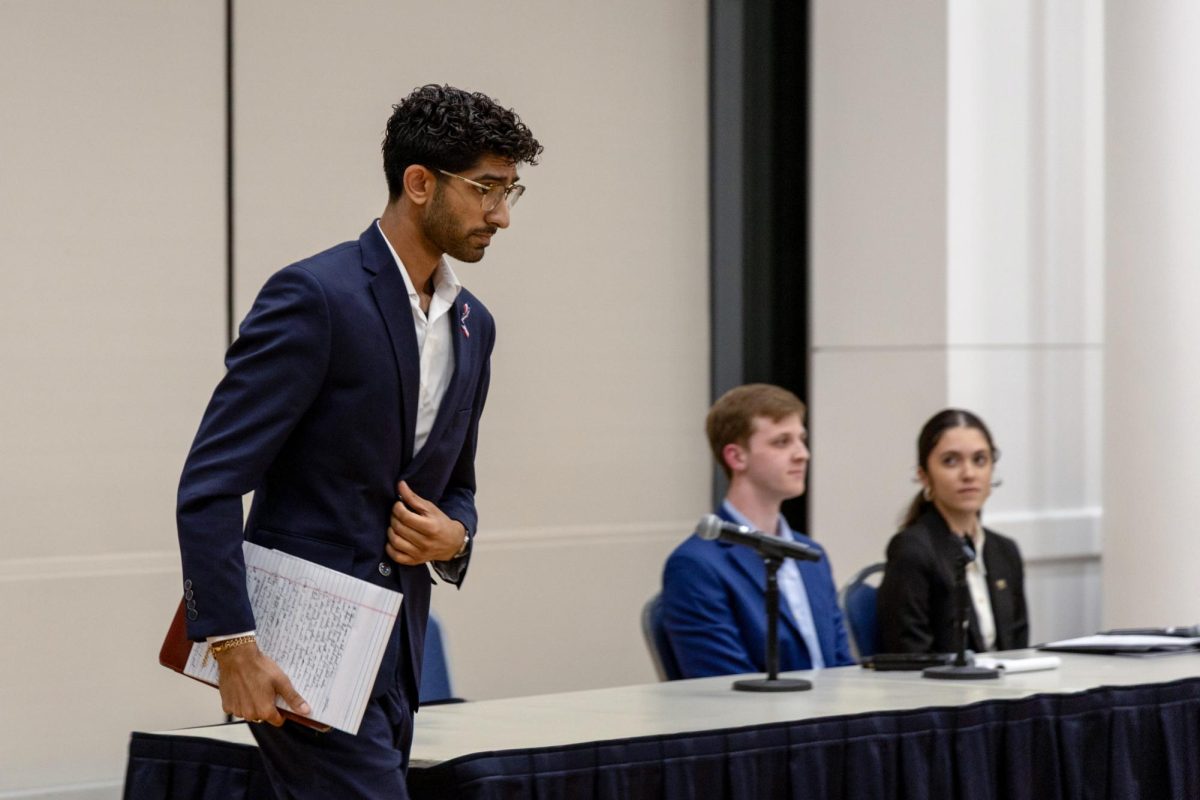More than 300 students united to celebrate the end of one of Ramadan’s fast days Wednesday night at the sixth annual GW Community Iftar.
This year’s Iftar had the highest turnout since the event began in 2002, possibly spurred by the discovery of more than 100 controversial posters Monday. Almost all the seats in the Marvin Center Grand Ballroom were filled.
“(Iftar) reflects the spirit of interfaith fellowship and cooperation,” University President Steven Knapp said to the crowd. “The posters . produced pain and shocked and embarrassed the (GW) community . But tonight shows we are eager to learn from one another.(in this) microcosm of the world at large.”
The Muslim Students’ Association, the Jewish Student Association and former University President Stephen Joel Trachtenberg planned the first annual GW Community Iftar following the events of Sept. 11.
GW Hatchet Video: GW Iftar 2007
play_blip_movie_426154();
Just days after controversial posters that offended the muslim community were hung on GW’s campus, members of the GW community gathered in the Marvin Center for the annual Ramadaan iftar break fast. University President Steven Knapp attended the event that brought together Jews, Muslims and other faiths to celebrate diversity and promote cross cultural understanding.
“(Iftar) is about making an effort to cross boundaries and continue the dialogue,” said Muslim Students’ Association Social Chair Najah El Bash. “The posters have made it even more significant and it shows the importance of events like this dinner.”
The night began with a breaking of the fast and prayer, followed by a dinner of kosher and halaal food. It aimed to bring students of Islamic and Jewish faith together to share food and dialogue.
Sophomore Malika Rangoonwale said she attended the Iftar dinner to hear how the GW community plans to respond to the poster controversy.
“After what happened I want to know what GW is going to do next, what the steps are to deal with this matter, questions like that,” Rangoonwale said.
Students from MSA and JSA participated in a candle lighting ceremony, where pairs of one Muslim and one Jewish student lit candles, then read passages from texts of both faiths that described the importance of light.
Freshman Sophia Tupolev said, “It’s inspiring to see the solidarity between various groups. It’s important to display our support for each others’ beliefs.”
“This is about coming together for a common goal,” said freshman Marc Friend. “It can even be a step toward peace.”
In addition to Iftar, the Interfaith Service Fellowship student organization was formed this year and has plans to perform service projects in the District.
“There is a history of interfaith dialogue at GW, but it hasn’t taken a big effect,” said Marcus Rubenstein, Student Association director for multi-religious affairs. “I want to help take it to the next level and have religious organizations always talking to each other and getting together for joint events.”
Raed Hergli, first secretary from the Tunisian embassy, attended the dinner.
“It was very interesting to see this gathering of Muslim and Jewish students,” Hergli said. “These (events) can foster understanding across religions.”
MSA, JSA, SA and the Office of University Events sponsored the Iftar dinner
“As an evangelical Christian, it was an amazing experience to sit at a table with students from MSA and JSA,” said Brand Kroeger, executive vice president of the SA. “I think it is comforting for students to see that the University sees what happened (regarding the controversial posters) as a problem but that we are also able to overcome it.”
SA President Nicole Capp said she did not think the poster incident affected the tone of the dinner.
Capp said, “This is a celebration. It always has been, and it always will be.”







